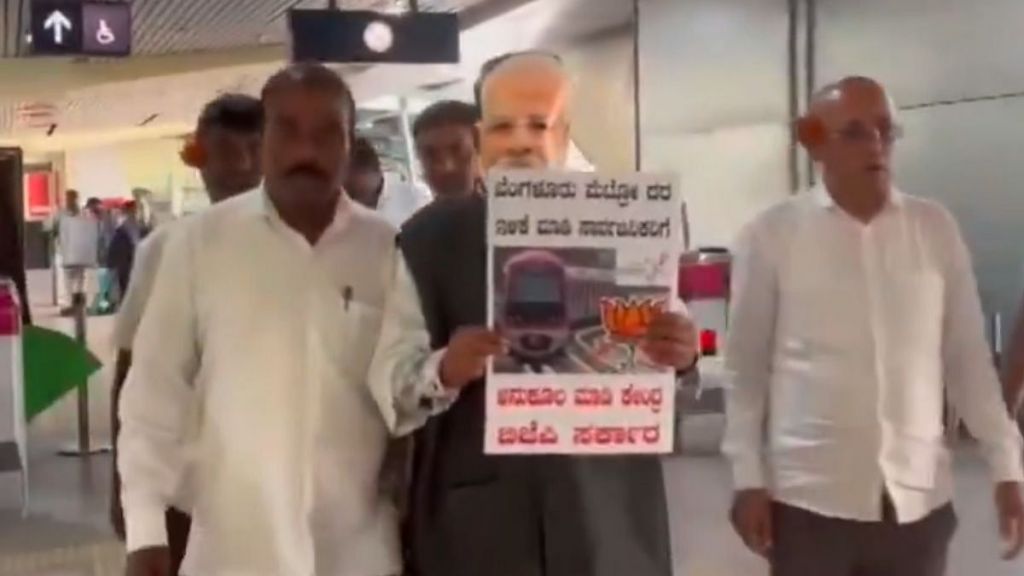
Bengaluru: Congress workers on Wednesday staged a protest against the central government at a few metro stations in Bengaluru over the recent increase in metro fares.
The protest was staged at the Rajajinagar and Malleswaram Mantri Mall metro stations. The workers were seen protesting by wearing masks of Prime Minister Narendra Modi and holding placards.
Following this, the Karnataka Chief Minister's Office on Tuesday issued a clarification about the recent fare hike.
#WATCH | Bengaluru, Karnataka | Congress workers stage a protest over the increased metro fares near the Rajajinagar and Malleswaram Mantri Mall metro stations in Bengaluru.
— ANI (@ANI) February 12, 2025
(Source: Congress workers) pic.twitter.com/ChW3ggVM9r
"Opposition party, BJP, is, as usual, spreading false and misleading information, accusing the state government and misleading the public. While citizens have every right to oppose government policies, a right that I respect, the BJP's deliberate misinformation and encouragement of protests for political gain are unacceptable," the statement by the CMO read.
BJP Blamed For Double Standards On Metro Fare Hike
"On one hand, BJP leaders claim credit for the achievements of Metro Rail under the Central government, but on the other, they blame the state government for the fare revision, which is an act of self-deception," the statement further added.
The Bengaluru Metro Rail Corporation Limited (BMRCL) was established jointly by the Central and Karnataka governments, with an equal (50-50) partnership.
BMRCL Operates Autonomously Under Central Law
According to a statement, officials from both central and state governments hold positions as managing directors and directors. Since BMRCL is an autonomous entity, the state government does not have complete control over it. Like all metro corporations across the country, BMRCL operates under the Metro Railways (Operations and Maintenance) Act, 2002, enacted by the central government.
"Since there had been no fare revision since 2017, BMRCL approached the central government to request a revision. If the state government had the authority to determine fares, why would BMRCL seek approval from the central government instead of us?" the statement pointed out.
It further explained that in response, the central government formed a fare revision committee headed by retired Madras High Court judge R. Tharani, which included representatives from both central and state governments.
The committee was constituted on September 16, 2024, and was given three months to submit its recommendations.
"During these three months, the committee consulted not only with BMRCL officials but also travelled to Delhi and Chennai to discuss fare structures and operations with officials from their metro rail corporations," the statement informed.
The committee studied fare structures set in June 2017, collected passenger feedback, and reviewed BMRCL's financial status. On December 16, 2024, the committee submitted its final report.
Back in June 2017, when BMRCL fixed the fare, only 42.3 km of the first phase of the Metro was operational. Now, with the partial completion of Phase 2, the Metro network has expanded. By December 2026, the Metro corridors (2, 2A, and 2B) will be fully completed, increasing the network to 175.55 km.
The committee submitted its report in 10 chapters after considering all aspects related to Bengaluru Metro. It also studied the fare structures of other metro systems across the country. Currently, Bengaluru Metro's minimum fare is Rs 10, and the maximum fare is Rs 60, whereas Mumbai Metro's minimum fare is Rs 10, and the maximum is Rs 80.
Except for the Delhi Metro, all states determined their initial metro fares independently. However, the fare revision is now decided by a committee appointed by the central government.
According to Section 37 of the Metro Railways (Operations and Maintenance) Act, metro corporations (in this case, BMRCL) are legally bound to implement the committee's fare revision recommendations.
Disclaimer: This is a syndicated feed. The article is not edited by the FPJ editorial team.